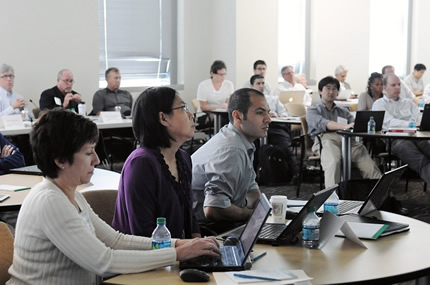3 Texas Universities Will Work To Move Research into the Marketplace Quicker
Three Texas universities will share in a $3.75-million National
Science Foundation (NSF) grant intended to move academic research into the marketplace.
Texas A&M University, the University of Texas at Austin and Rice University will join in creating the Southwest Alliance for Entrepreneurial Innovation Node, a function of the NSF's Innovation Corps program, also known as I-Corps.
Similar I-Corps nodes already exist elsewhere in the United States, in places like California's Silicon Valley, the Washington, D.C. area, Southern California and New York City. However, this will be the first such hub in the Southwestern region of the country.
| |

Participants in the I-Corps node attend training sessions intended to help them move their academic research into the commercial world. |
|
The Texas-based node will work in partnership with 33 other institutions in the region that collectively represent more than $600 million in NSF funding in fields as varied as bioscience, K-12 education, geosciences, psychology and oil and gas research.
The program's purpose is to encourage scientists and engineers at academic institutions to consider how their fundamental research projects could become commercial ventures.
"Having an I-Corps node established in Texas represents a unique opportunity for researchers across the state and region to leverage existing research efforts into new business initiatives," said Juan Sanchez, vice president for research at UT Austin, which will be the lead partner in the node.
Three-person teams at the participating universities and institutions will be able to apply for six-month $50,000 grants to explore the commercialization of fundamental research ideas. The teams — each made up of an NSF-funded researcher, a business mentor and a graduate student — will then go through a six-week training process that includes both live workshops and virtual team presentations into how to move their ideas into the marketplace.
The training is modeled after Stanford University's Lean LaunchPad course that teaches its students effective startup methods and technology commercialization.
"Universities are the birthplace of new ideas and the epicenter of life-changing research," said Brad Burke, managing director for the Rice Alliance for Technology and Entrepreneurship. "This new initiative is a paradigm shift that will facilitate a cultural change in universities and research centers designed to take researchers' creativity and innovation to the commercial level."
About the Author
Michael Hart is a Los Angeles-based freelance writer and the former executive editor of THE Journal.